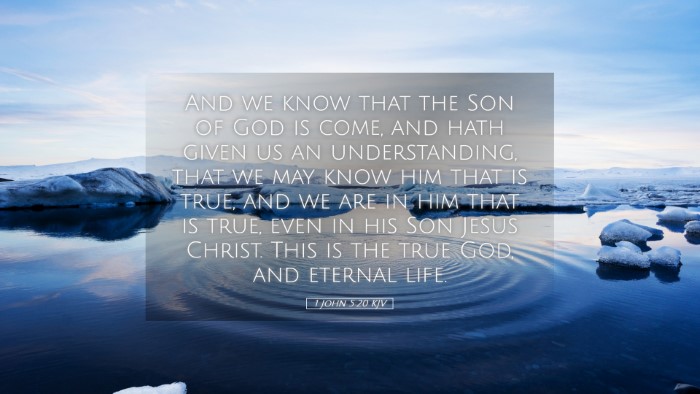Old Testament
Genesis Exodus Leviticus Numbers Deuteronomy Joshua Judges Ruth 1 Samuel 2 Samuel 1 Kings 2 Kings 1 Chronicles 2 Chronicles Ezra Nehemiah Esther Job Psalms Proverbs Ecclesiastes Song of Solomon Isaiah Jeremiah Lamentations Ezekiel Daniel Hosea Joel Amos Obadiah Jonah Micah Nahum Habakkuk Zephaniah Haggai Zechariah Malachi1 John 5:20
1 John 5:20 KJV
And we know that the Son of God is come, and hath given us an understanding, that we may know him that is true, and we are in him that is true, even in his Son Jesus Christ. This is the true God, and eternal life.
1 John 5:20 Bible Commentary
Commentary on 1 John 5:20
Bible Verse: "And we know that the Son of God has come and has given us understanding, so that we may know him who is true; and we are in him who is true, in his Son Jesus Christ. He is the true God and eternal life." (1 John 5:20, ESV)
Introduction
The final verses of 1 John encapsulate the profound theological truths that the Apostle John has articulated throughout his epistle. These words carry immense weight, particularly for pastors, theologians, and students of Scripture as they unpack the essence of Christ's revelation and the believer’s assurance in Him.
Exegesis of the Text
This verse serves as a culmination of the letter’s purpose: to affirm the reader's faith in Jesus Christ. John presents several critical truths that merit exploration.
1. The Coming of the Son of God
Matthew Henry points out that the coming of the Son of God is central to Christian belief, marking the divine intervention in human history. This incarnation is essential, as it demonstrates God’s love and reveals His character to humanity.
Albert Barnes emphasizes that this coming is not merely historical but also relational. It brings believers into a personal understanding of God, transforming their demeanor and outlook on eternity.
2. Understanding and Knowledge
John's assertion that Jesus has "given us understanding" is profound. Adam Clarke notes that this understanding is a spiritual enlightenment that enables believers to comprehend divine truths. It is through Christ that they gain insight into the nature of God.
- Spiritual Insight: This understanding goes beyond intellectual knowledge; it is illuminated by the Holy Spirit.
- Experiential Knowledge: According to Matthew Henry, true understanding involves experiencing God in one’s life, leading to a transformative faith.
3. Knowing Him who is True
The phrase "him who is true" refers to God's ultimate reality as the one true God. Albert Barnes interprets this as a direct contrast to the idols and false teachings prevalent in the surrounding culture. This knowledge forms the foundation of Christian faith.
This true knowledge is relational; believers are called into a relationship with God that is founded on truth rather than mere belief in doctrines.
4. The Relationship We Share
John connects believers’ identity with their understanding of Christ: "and we are in him who is true." Adam Clarke explains that to be "in him" signifies a union between Christ and the believer, parallel to other New Testament teachings on being in Christ.
- Union with Christ: This union is vital for spiritual sustenance and growth.
- Identity in Christ: Believers find their identity and purpose through this relationship.
5. Christ’s Nature: True God and Eternal Life
John concludes with a powerful declaration of Christ’s divinity, affirming Him as "the true God and eternal life." Matthew Henry elucidates that this affirms the doctrine of the Trinity and the deity of Christ, which is essential for understanding salvation.
Albert Barnes notes that eternal life is not just a future hope but a present reality realized in fellowship with Jesus, further verifying the believer's assurance in their faith.
Theological Implications
This verse demonstrates a synthesis of essential doctrines including Christology (the nature of Christ) and soteriology (the doctrine of salvation).
- Christ as Mediator: The coming of Christ establishes Him as the mediator between God and humanity.
- Assurance of Faith: Believers can find confidence in their salvation, rooted in their understanding of Christ as the true God.
Practical Applications
For pastors and educators, this verse imparts crucial insights into preaching and teaching about the nature of Christ and the assurance of believers:
- Affirm the Deity of Christ: Regularly emphasize Christ’s divine nature in sermons and teachings to combat cultural and theological distractions.
- Encourage Personal Relationships: Cultivate an environment where believers are encouraged to deepen their personal relationship with Christ through prayer and study.
- Highlight the Assurance of Eternal Life: Comfort the congregation with the knowledge that their relationship with Christ guarantees eternal life.
Conclusion
1 John 5:20 is a rich source of doctrine and inspiration for the Christian faith. Through the insights from Matthew Henry, Albert Barnes, and Adam Clarke, readers are reminded of the importance of understanding who Christ is—true God and giver of eternal life. Their reflections pave the way for deeper exploration and revelation in the life of every believer, encouraging an authentic and transformative faith in the Son of God.


